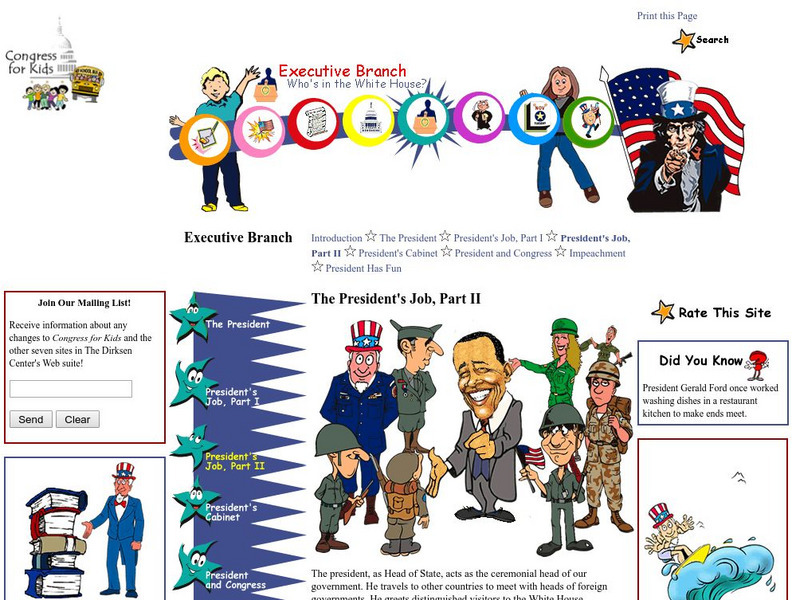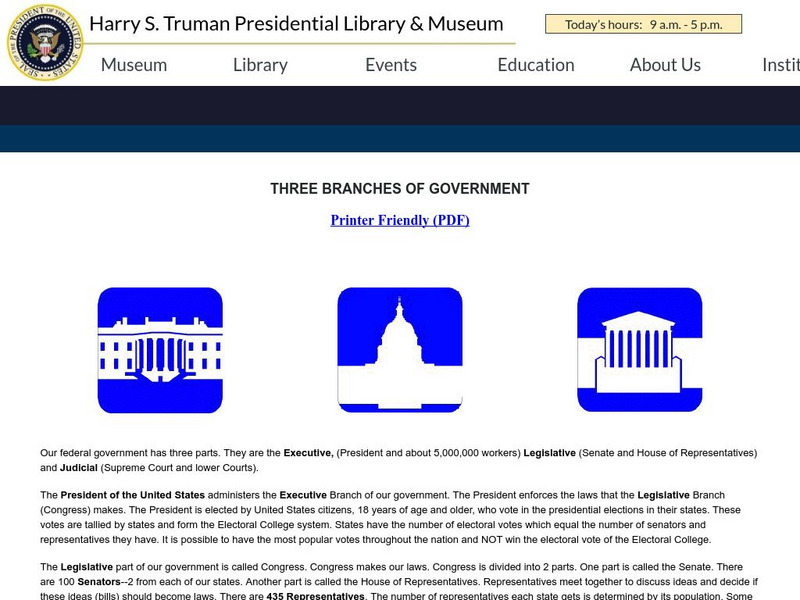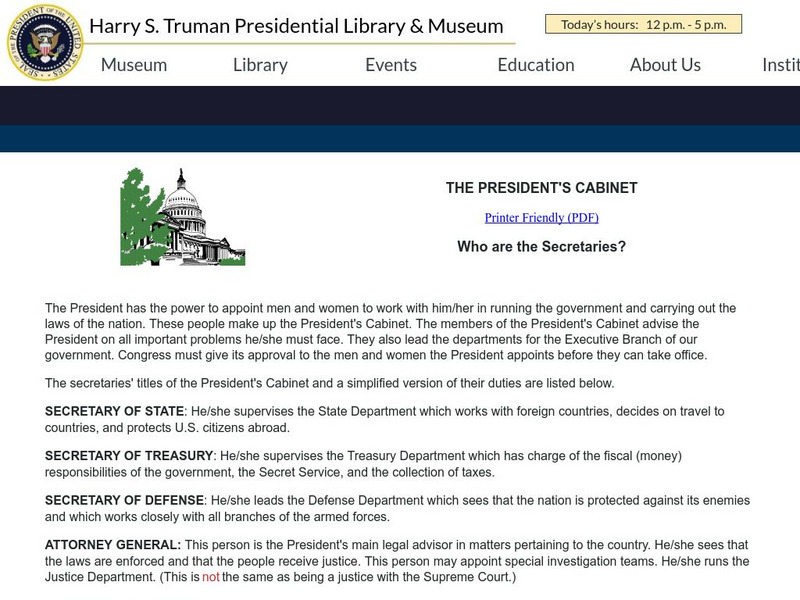Hi, what do you want to do?
iCivics
I Civics: A Very Big Branch
Students learn how the executive departments and agencies regulate and enforce governmental policies, and they explore the roles and responsibilities of the presidential cabinet.
US National Archives
National Archives: Lesson Plans Congress, the President, and the War Powers
Examine the power of Congress to make war by studying primary source documents from various wars throughout U.S. history. Students will analyze how the balance of authority between the legislative branch and executive branch has changed...
Other
President Gerald Ford's Special Message to Congress
Learn about the working relationship between the legislative and executive branches of government through Ford's address to Congress in 1976 addressing the need for improvements to programs for the elderly.
Read Works
Read Works: The Three Branches of Government
[Free Registration/Login Required] Intended for early elementary students, ReadWorks provides an information text about the three branches of government. A question sheet is available to help students build skills in reading comprehension.
US Government Publishing Office
Ben's Guide to u.s. Government: President of the u.s. Requirements & Term
A short paragraph on the requirements for holding the president or vice-president position. There is also a paragraph on the number of terms they can serve.
The White House
The White House: The Executive Office of the President
Explains the purpose of the Executive Office of the President, and provides links to the many departments and people that are part of this Office, and who serve to advise the President, to enact his directives, and to communicate his...
Thomson Reuters
Find Law: Article Ii: The President as a Law Enforcer
Read Section 3 of Article II which explains what the President's duties are as Law Enforcer. The Constitution does not state that the President shall execute the laws himself, but that he will ensure that laws are "faithfully executed."
This Nation
This nation.com: Executive Order 13132 of August 4, 1999
This Executive Order signed by President Bill Clinton on 8/4/99 is an order that describes the balance between state and federal governments, as warranted by the Framers of the Constitution and federalism.
Thomson Reuters
Find Law: u.s. Constitution: Article Ii: Powers and Duties of the President
This resource provides the annotation on Section 2, Clause 1 of the United States Constitution., which outlines the President's responsibilities as Commander-in-Chief.
Other
Center for the Study of the Presidency and Congress
The Center for the Study of the Presidency is a non-partisan and non-profit corporation. Inspired by Dwight Eisenhower's 1969 call for programs on the American Presidency for 'students old and young.'
The Dirksen Congressional Center
Congress for Kids: The President and Congress
A brief description of the interaction between the president and Congress. Also includes information about the process for signing a bill into a law and take a quiz to test your learning.
The Dirksen Congressional Center
Congress for Kids: Executive Branch: President's Job, Part Ii
The President of the United States has a very important job to do. Find out about some of the necessary tasks of the the Commander in Chief.
TED Talks
Ted: Ted Ed: How Do Executive Orders Work?
The framers of the American Constitution made the executive power available to the executive branch. But what exactly is this tool, how does it work, and what's the extent of its power? Christina Greer explains.
Yale University
Avalon Project: Constitution of the United States: Article Ii
Read the text of Article II of the Constitution, the four sections of which lay out the powers and duties of the executive branch of the federal government.
The White House
The White House: Welcome to the White House
The official site for The White House and the Executive Branch of government. The site offers current as well as historical events, speeches, documents, and more. Includes up to date information about the Obama administration, current...
Harry S. Truman Library and Museum
Harry S. Truman Library & Museum: Three Branches of Our Government
This slide and the six that follow it (use the advance button near the bottom of the screen) offer an explanation of each of the three branches of government and the duties they perform, including discussion of the tensions arising from...
iCivics
I Civics: Mini Lesson: Vice President
Find out about the importance of the vice presidential candidate in a presidential election, how this person is more than a running mate, the history of the office of the vice presidency, and the modern role of the VP.
iCivics
I Civics: Mini Lesson: Executive Orders
Students discover how presidents use executive orders to wield power and how the legislative and judicial branches support and challenge these measures.
US Government Publishing Office
Ben's Guide to u.s. Government: The President's Cabinet
This is a fun way to teach elementary students about the Presidential Cabinet, which includes the Vice President, 14 secretaries from executive departments and the Attorney General of the United States. Learn about this group's role in...
Have Fun With History
Have Fun With History: u.s. Presidents
Module in which students and teachers can find information through videos, library or museum sites on presidents of the United States as well as general information on the presidency and the White House.
Alabama Learning Exchange
Alex: What Does the President of the United States Do?
Students will create a wiki page that reflects the President of the United States fulfilling five of his formal or informal roles. Students will use the Internet to visit the White House Photo Gallery and capture shapshots of the...
Harry S. Truman Library and Museum
Harry S. Truman Library: The President's Cabinet
Features a teacher-directed activity that explores the President's Cabinet and the duties of each secretary.
Scholastic
Scholastic: Listen and Read: Meet the President: Activity 1
Follow the President of the United States as he signs laws, meets with foreign leaders, and leads our armed forces in this audio article for young students.
C-SPAN
C Span Classroom: Teaching About Gridlock
Learning module and lesson plan with C-SPAN video resources and related articles for students to examine and deliberate on whether or not the President should exercise executive powers during times of Congressional gridlock.




















